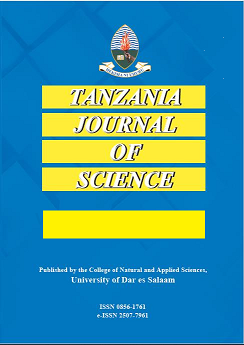Heavy Metal Contamination and Potential Ecological Risks in Surface Sediments along Dar es Salaam Harbour Channel
DOI:
https://doi.org/10.4314/tjs.v47i5.11Keywords:
Dar es Salaam harbour channel, Heavy metals, Contamination, Sediments, Degree of contamination, Ecological risksAbstract
Investigation of heavy metal contamination along Dar es Salaam harbour channel was carried out in order to determine their current concentrations, sources and potential ecological risks to benthic biota. Sampling was carried out from January to May 2019 and samples analysed using ICP-OES and C-H-N-S analyser. Analysis of heavy metal relationships showed that, Cu, Zn, Cr, As, Ni, Co, Fe, Cd had strong relationships with each other, while Pb only related to Zn. Principal component analysis partitioned metals into two groups; PC1: Ni, Cr, Fe, Co, As, Cu, Cd, and Zn explaining 73.6% variance and PC2: Pb, Zn, and Cd with 13.7% variance. Similarly, Cd, Pb and Zn had severe to very high enrichments (Cd > Pb > Zn) showing serious anthropogenic contamination of these metals in sediments along Dar es Salaam harbour channel. Degree of contamination and potential ecological risks varied from low, moderate, to high; indicating that sediments were considerably contaminated with heavy metals. Levels of contamination varied in space and according to the type of heavy metal Higher contamination and ecological risks were revealed at the harbour area probably due to the observed high concentrations of Cd, Pb and Zn. Monitoring of metals should be emphasized in order to control contaminants release into this area from their sources.
Keywords: Dar es Salaam harbour channel, Heavy metals, Contamination, Sediments, Degree of contamination, Ecological risks.


